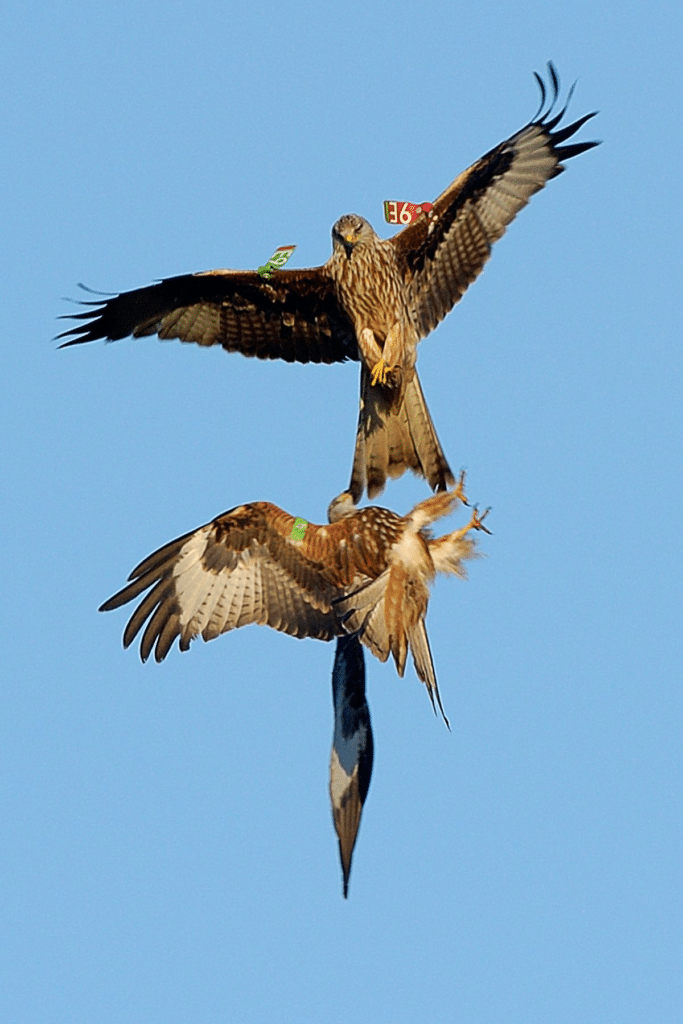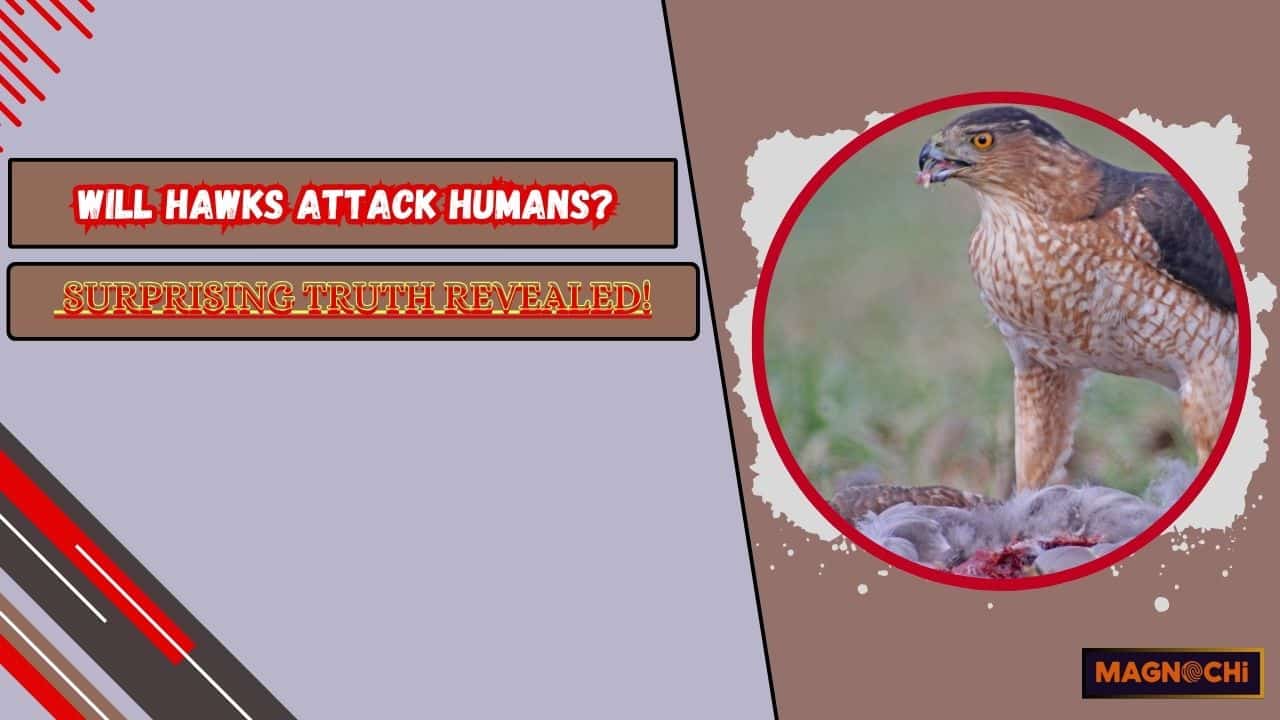Will Hawks Attack Humans? Hawks are among the most striking creatures in the animal kingdom.
Their powerful flight, incredible eyesight, and razor-sharp talons make them formidable hunters and fascinating to watch. But one question often arises: will hawks attack humans?
It’s easy to assume that such majestic predators could be dangerous to humans, but the truth is more nuanced.
Understanding the behavior of hawks, what prompts them to act aggressively, and how to avoid conflict with these birds is essential if you find yourself living near or interacting with them.
This article will delve into everything you need to know about hawk attacks, covering their nature, reasons for aggression, real-life incidents, and tips for staying safe.
Whether you’re a bird enthusiast or someone who simply wants to understand the risks, this article will give you the facts, clear up misconceptions, and help you navigate any potential encounters with hawks.
What Are Hawks?
A Snapshot of Their Role in Nature
Hawks are birds of prey belonging to the Accipitridae family. Along with eagles, kites, and harriers, they form part of the broader group known as raptors, which are renowned for their hunting skills.
These birds are equipped with excellent vision, strong talons, and sharp beaks, all of which aid them in catching and eating prey. [Will Hawks Attack Humans?]
Hawks generally hunt small animals, including small mammals, birds, and occasionally reptiles.
The most common species of hawks in North America include:
- Red-tailed Hawk: Known for its distinctive reddish tail and large size, this species is a widespread and iconic hawk.
- Cooper’s Hawk: A medium-sized hawk that thrives in suburban areas, particularly where birds are abundant.
- Sharp-shinned Hawk: A smaller hawk often found in forests and rural areas, known for its speed and agility in hunting.
Hawks, as formidable predators, play an important role in the food chain, controlling populations of rodents and other small animals, which helps to maintain ecological balance.
They primarily rely on their exceptional eyesight to spot prey from great distances, and their powerful talons help them capture and kill their target.
However, despite their fearsome reputation, hawks are not typically dangerous to humans unless provoked or threatened.

Do Hawks Attack Humans?
The thought of a hawk attacking a human is both fascinating and unsettling. Hawks, by nature, are not inclined to seek out humans as prey. [Will Hawks Attack Humans?]
They are not naturally hostile toward people, and most interactions between hawks and humans result in little more than the bird flying away to continue its daily hunt.
However, there are exceptions where hawks might show aggressive behavior.
Why Do Hawks Attack Humans?
There are a few reasons why a hawk might attack or show aggression towards humans, but it’s important to note that such instances are extremely rare and usually happen only under specific conditions.
Nesting Season:
Hawks are particularly territorial during the breeding season, which typically runs from early spring to summer. During this time, hawks are highly protective of their nests and offspring.
If they perceive a human as a threat to their young or their territory, they may exhibit aggressive behaviors such as swooping, vocalizing loudly, or even attacking.
Mistaken Identity:
Hawks rely heavily on their sharp vision to hunt for prey. In some cases, they may mistake a human for a smaller animal, especially if the person is making sudden movements.
This is particularly true if the hawk is hunting and moving at high speeds.
However, hawks do not intentionally hunt humans, and these incidents are usually quick and more like warning shots than true attacks.
Territorial Aggression:
Hawks are extremely territorial animals, and they often defend large areas to safeguard their food source and breeding grounds.
In suburban or rural regions, hawks may feel threatened if they perceive someone entering their domain.
For example, a hawk might aggressively defend a hunting ground, especially if it feels that its ability to feed is being threatened.

Are Hawk Attacks on Humans Common?
The short answer is: no. Hawk attacks on humans are exceedingly rare. Hawks are not naturally inclined to target humans, and the vast majority of encounters between humans and hawks are peaceful.
Most hawk species, such as the Red-tailed hawk, live in rural or remote environments, where they are more focused on hunting than interacting with people.
Even in more suburban settings, hawks tend to avoid humans and would rather fly off than engage. [Will Hawks Attack Humans?]
That being said, hawks may become more aggressive during the nesting season, as they are deeply protective of their young.
During these months, human intruders near nests may provoke an aggressive response.
For example, there are reports of hawks dive-bombing cyclists, joggers, or even people walking their dogs if they unknowingly wander too close to their nests.
Instances of Hawk Attacks
Although hawk attacks are rare, there have been some notable incidents. Most of these occur during the breeding season, when hawks are especially territorial and defensive.
Real-Life Examples of Hawk Attacks
- The Case of Cooper’s Hawks in Suburban Areas: In suburban neighborhoods, particularly where there are large bird populations, hawks like Cooper’s Hawks may dive at people who get too close to their nests. These attacks usually involve the hawk swooping down to warn the human away, but in rare cases, the bird may cause minor injuries.
- Red-Tailed Hawk Swoops on Cyclists: In areas where Red-tailed Hawks have established nesting sites, cyclists and hikers have occasionally reported being dive-bombed by hawks as they pass too close to the nesting area. While these attacks are frightening, they generally don’t result in serious injury and are more about the hawk defending its territory.
- Attacks on Pets: Hawks can also target small pets, like cats or small dogs, if they feel threatened or hungry. In some urban areas, hawks may mistake pets for prey. Although these incidents are rare, they do occur, particularly in regions where hawks hunt in close proximity to human settlements.
Frequency of Attacks
While hawks can show aggressive behavior, these attacks are far from common.
The majority of hawk encounters are uneventful, and most people will never experience anything more than the occasional hawk flying overhead or sitting in a tree.
For the most part, hawks prefer to keep their distance from humans.

Are Hawk Attacks Dangerous?
While hawk attacks are generally not life-threatening, they can still result in injuries.
The primary danger from a hawk attack is its sharp talons, which are designed to grab and immobilize prey. [Will Hawks Attack Humans?]
These talons can cause cuts or puncture wounds, which might require medical attention.
Potential Injuries from Hawk Attacks
- Scratches and Minor Cuts: The most common injuries from a hawk attack are scratches and minor cuts. These can be easily treated with antiseptic and bandages.
- Puncture Wounds: In more severe cases, a hawk’s talons can puncture the skin, leading to deeper injuries that may require stitches. Infections are also a risk if the talons are not properly cleaned.
- Eye Injuries: Since hawks tend to target the head and face when they feel threatened, there is a risk of eye injuries from a hawk’s talons or beak. These types of injuries are rare but can be more serious and require immediate medical attention.
While the injuries from a hawk attack can be alarming, they are usually not severe, and the bird will typically retreat once it feels the threat has been neutralized.
How to Avoid Hawk Attacks
The risk of a hawk attack is low, but it’s still important to know how to protect yourself if you live in an area with hawks. There are several steps you can take to minimize the chance of an attack.
Tips for Avoiding Hawk Attacks
- Respect Hawk Territories: Hawks are highly territorial during the breeding season. Avoid areas with known nests, especially in the spring and summer months.
- Move Slowly and Calmly: If you find yourself in a situation where a hawk is near, move slowly and avoid making sudden movements. Quick gestures can trigger a hawk’s hunting instincts and might cause it to swoop at you.
- Cover Your Head: If a hawk begins to swoop toward you, protect your head and neck. Using a hat, umbrella, or jacket can help shield you from a hawk’s talons.
- Keep Small Pets Indoors: If you live in an area with hawks, it’s essential to supervise small pets when they’re outside. Hawks may mistake small pets for prey, especially in areas where their natural food sources are limited.
- Avoid Nesting Areas: If you spot a hawk’s nest, keep your distance, particularly during the breeding season. If you accidentally come too close, the hawk may see you as a threat and become defensive.
What Should You Do If a Hawk Attacks You?
Although the risk of a hawk attack is low, it’s important to know what to do in case of an encounter. If you’re attacked by a hawk, there are several steps you can take to minimize injury and stay safe.
Steps to Take in Case of a Hawk Attack
- Stay Calm: Try to remain calm and avoid panicking. The hawk will likely stop attacking once it realizes you’re not a threat.
- Cover Your Head: Protect your head and face with your arms, a jacket, or any other available object. Hawks often aim for the head during an attack.
- Move Slowly Away: Slowly back away from the area without making sudden movements. This will signal to the hawk that you are retreating and are no longer a threat.
- Seek Medical Attention: If you are injured, especially if the wound is deep or bleeding heavily, seek medical attention. Hawk talons can carry bacteria, which can lead to infection.
- Report the Incident: In some cases, it may be a good idea to report the attack to local wildlife authorities. They may be able to provide guidance and assess whether the hawk needs to be relocated or monitored.
Are Hawk Attacks Seasonal?
Yes, hawk attacks are more likely to occur during the breeding season (spring to early summer). During this time, hawks are particularly territorial and protective of their nests and young.
Why Does Seasonality Matter?
- Breeding Season: During the breeding season, hawks are more likely to engage in aggressive behavior to protect their nests and offspring from perceived threats. The hawks’ protective instincts are heightened, and they are more likely to attack intruders.
- Non-Breeding Season: Outside of the breeding season, hawks are generally less territorial and more focused on hunting. As a result, hawk attacks are much less common during this time.
Can Hawks Carry Off Small Pets?
Hawks are powerful predators, but they usually target small mammals, birds, and reptiles, not humans. [Will Hawks Attack Humans?]
That said, small pets can be at risk, particularly if they are left outside unsupervised in areas where hawks are known to hunt.
Pet Safety Tips
- Supervise Pets Outdoors: Always keep an eye on small pets when they are outside, especially in areas where hawks are common. Small dogs and cats are most at risk.
- Avoid Leaving Pets in Hawk Territory: Avoid leaving small pets unattended in areas known to be frequented by hawks, especially during their hunting hours (early morning or late afternoon).
How to Recognize Hawk Aggression
It’s essential to know the signs of hawk aggression to avoid potential attacks. Hawks generally don’t attack without provocation, but they can show aggressive behavior if they feel threatened.
Signs of Aggression:
- Vocalizations: A hawk might screech or make loud calls to warn you away from its territory.
- Alert Posture: The hawk might stand still and puff up its feathers as a way to signal that it feels threatened.
- Swooping: A hawk might perform a swooping dive towards you to demonstrate its territory or to warn you away.
By recognizing these signs early, you can avoid getting too close to a hawk’s nest or territory and reduce the likelihood of an attack.
Final Verdict
While it’s natural to be cautious about hawks, the reality is that hawk attacks on humans are rare. [Will Hawks Attack Humans?]
Hawks are not naturally inclined to attack humans; instead, their aggression is typically related to territorial instincts, especially during the breeding season.
By respecting their space, staying aware of their behavior, and following basic safety precautions, you can enjoy the beauty of these magnificent birds without fear.
FAQs
Are hawks aggressive to humans?
Hawks are not usually aggressive towards humans. They may act defensively if they feel threatened, especially during nesting season. If you stay away from their nests, they typically won’t pose a threat.
Is it bad to have a hawk in your yard?
It’s not bad to have a hawk in your yard. They help control smaller animal populations. However, if you have small pets, you should keep an eye on them to prevent any potential attacks.
Can a hawk pick up a person?
Hawks cannot pick up a person. They are strong hunters but are only capable of carrying smaller prey like rodents or birds. A person is too large for them to lift.
Can a hawk pick up a 10 lb dog?
Hawks cannot typically pick up a 10 lb dog. Most hawks are only able to lift prey that weighs up to 4-5 lbs. However, small dogs should still be monitored around hawks.
What are hawks most afraid of?
Hawks are afraid of larger predators like eagles or humans. They also avoid loud noises or sudden movements that might signal danger. Anything that threatens their territory can make them feel unsafe.
What does it mean when a hawk comes to you?
A hawk coming to you might symbolize awareness or a spiritual message. It could also mean you are in its territory or near its hunting area. Hawks are curious creatures but typically won’t approach unless they feel safe.
How do you scare hawks away?
To scare hawks away, use shiny objects like reflective tape or balloons. Loud noises or sudden movements also help. Avoid attracting smaller animals to your yard as they may attract hawks.
Why is a hawk dive bombing me?
A hawk dive-bombs to protect its nest or young. This behavior is common during breeding season. It’s a sign that you’re too close to its territory, and it’s warning you to stay away.
Conclusion: Will Hawks Attack Humans?
In conclusion, hawk attacks on humans are very rare. While these birds are formidable predators, they are generally not interested in humans as prey.
Hawk attacks typically occur only when they feel threatened, particularly during the breeding season when they are protecting their nests.
By being aware of hawk behavior, respecting their territory, and following safety guidelines, you can enjoy the presence of these magnificent birds without fear.
So, if you ever encounter a hawk, remember: they are as interested in staying away from you as you are from them. With the right knowledge and approach, you can safely coexist with these fascinating creatures. [Will Hawks Attack Humans?]
Read more knowledgeable blogs on Magnochi









